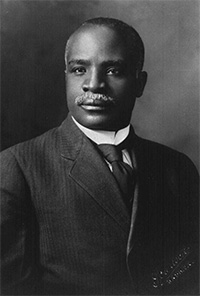
Celebrating Educators for Black History Month: Kelly Miller
Kelly Miller was a prominent Black educator, mathematician, and sociologist at the turn of the 20th century. Known as the “Bard of the Potomoc” for his extensive writings on a wide range of subjects, his work and influence extended beyond the academic realm into civil rights and social justice.
Born on July 23, 1863, in Winnsboro, South Carolina, to a free Black father and a mother who had been formerly enslaved, Miller’s early life was set against the backdrop of the Civil War and the subsequent Reconstruction era, a period that profoundly shaped his worldview and career.
Miller’s academic prowess became evident when he earned a scholarship to attend Howard University in Washington, D.C., where he later became a professor and served as the College of Arts and Sciences dean. His tenure at Howard was marked by significant contributions to the curriculum, particularly in establishing the sociology department, one of the first in the nation at a historically black college or university (HBCU).
As an educator, Miller was deeply committed to his students’ intellectual and moral development. He believed in the power of education as a tool for racial uplift. He was a staunch advocate for the liberal arts, arguing that a broad education was essential for developing critical thinking skills and civic responsibility. Miller’s educational philosophy was influenced by the challenges faced by African Americans during the post-Reconstruction era, including Jim Crow laws and the disenfranchisement of Black voters. He saw education as a means to challenge these oppressive systems and advance Black Americans’ rights and status.
Miller was also a prolific writer and thinker. He contributed to the national race and social justice dialogue through his essays, newspaper columns, and books. His writings often addressed the complexities of race relations in America, advocating for a balanced approach to racial integration and equality. Miller’s intellectual contributions extended to the realms of sociology and mathematics, where he made significant strides despite the racial barriers of his time.
In civil rights, Miller was a moderate voice who sought to bridge the divide between the accommodationist stance of Booker T. Washington and the more radical approach of W.E.B. Du Bois. Miller believed in the importance of both industrial and higher education, arguing that African Americans needed practical skills to advance economically while also requiring the critical thinking skills provided by a liberal arts education to challenge racial injustices.
Kelly Miller’s legacy is one of intellectual rigor, educational innovation, and a steadfast commitment to social justice. His work laid the groundwork for future generations of African American scholars and activists, and his life exemplifies the profound impact that education and scholarship can have on the struggle for civil rights. Miller’s contributions to education, sociology, and the broader social discourse on race remain relevant today and are a reminder of the power of informed and engaged scholarship in the pursuit of equality and justice.
Today, several sites in Washington, D.C. are named after Miller, including a middle school, a 12-acre park, a public housing complex, and more.
